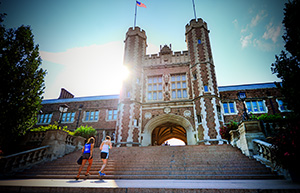 A task force created last fall at Washington University in St. Louis to study issues of sexual assault and relationship violence has completed its work and is recommending a number of measures that aim to create a supportive, respectful campus environment where sexual assault is a rare occurrence.
A task force created last fall at Washington University in St. Louis to study issues of sexual assault and relationship violence has completed its work and is recommending a number of measures that aim to create a supportive, respectful campus environment where sexual assault is a rare occurrence.
Convened by Provost Holden Thorp, PhD, and Sharon Stahl, PhD, former vice chancellor for students, the task force, which comprised students, faculty and staff, launched in January and focused its efforts in four key areas — assessment, policies and processes, prevention and education. The group began by conducting a thorough audit of existing sexual assault and relationship violence services, policies and evaluation, and while acknowledging that much good work has occurred on campus in these areas, identified the following areas of concern:
- Campus support and prevention efforts exist, but are highly fragmented.
- Resources are lacking for certain segments of the student population, and mandatory programming for students beyond the first year needs to be expanded.
- Additional staff is needed in the Relationship and Sexual Violence Prevention (RSVP) Center.
- Faculty and staff are not required to complete training on reporting responsibilities and how to support students who may share information about sexual assault and relationship violence.
- The student judicial code does not properly define consent.
- Evaluation efforts need to be better coordinated.
“I’m grateful to the task force for shedding light on these programs and pinpointing the areas where we can focus our efforts to bring about meaningful change,” Thorp said.
The task force report is available here.
“Sexual assault and relationship violence are difficult issues that must be addressed directly and honestly, which first requires acknowledging that we have serious work to do,” said Lori S. White, PhD, who succeeded Stahl as vice chancellor for students earlier this year.
“Especially on the heels of the sobering statistics we received earlier this week from the results of the AAU Campus Climate Survey on Sexual Assault and Sexual Misconduct, the work of our task force becomes even more relevant,” she said. “Through the task force’s diligence and exceptional dedication, we now have a road map that will help guide our course as we increase our efforts to create a safer, more supportive community for our current and future students.”
At the recommendation of the task force, Thorp and White have appointed an implementation committee to review and prioritize the task force’s recommendations. This committee will be led by Adrienne Davis, JD, vice provost and William M. Van Cleve Professor of Law.
“The task force did an outstanding job of diving deeply into the issues and identifying some specific areas with potential for improvement,” Davis said. “Now the important work of putting ideas into action begins. Our challenge as we think about implementation will be to figure out exactly where we can have the greatest impact to reinforce our existing strengths, shore up the weak spots, and drive the cultural change within our community that will ultimately turn the tide on this critical and troubling issue.”
Task force co-chairs were: Tonya Edmond, PhD, associate dean for diversity and associate professor, Brown School; Alan Glass, MD, assistant vice chancellor and director of Student Health Services, and associate professor of clinical psychiatry, School of Medicine; Lisa Moscoso, PhD, associate dean for student affairs and assistant professor, School of Medicine; Libby Ward, a 2015 graduate in Arts & Sciences; and Austin Wesevich, a third-year medical student also working on a master’s in public health. Jessica Wilen, special projects coordinator in the Office of the Vice Chancellor for Students, served as task force coordinator.
Sexual assault and relationship violence prevention programs currently in place at Washington University are focused in three main areas — education and prevention, student support and law enforcement and disciplinary processes. Efforts include mandatory presentations of programming for incoming students; participation in national programs including “Green Dot” and “It’s On Us;” training for students, faculty and staff; and support services through the RSVP Center and a number of professional and peer counseling programs.
In addition, dedicated staff resources include a full-time Title IX coordinator, the director of the RSVP Center, and a full-time sexual and relationship violence prevention specialist.
The university also participated in the AAU Campus Climate Survey on Sexual Assault, which was completed earlier this month. More information about the survey, including Washington University’s full report, is available here.